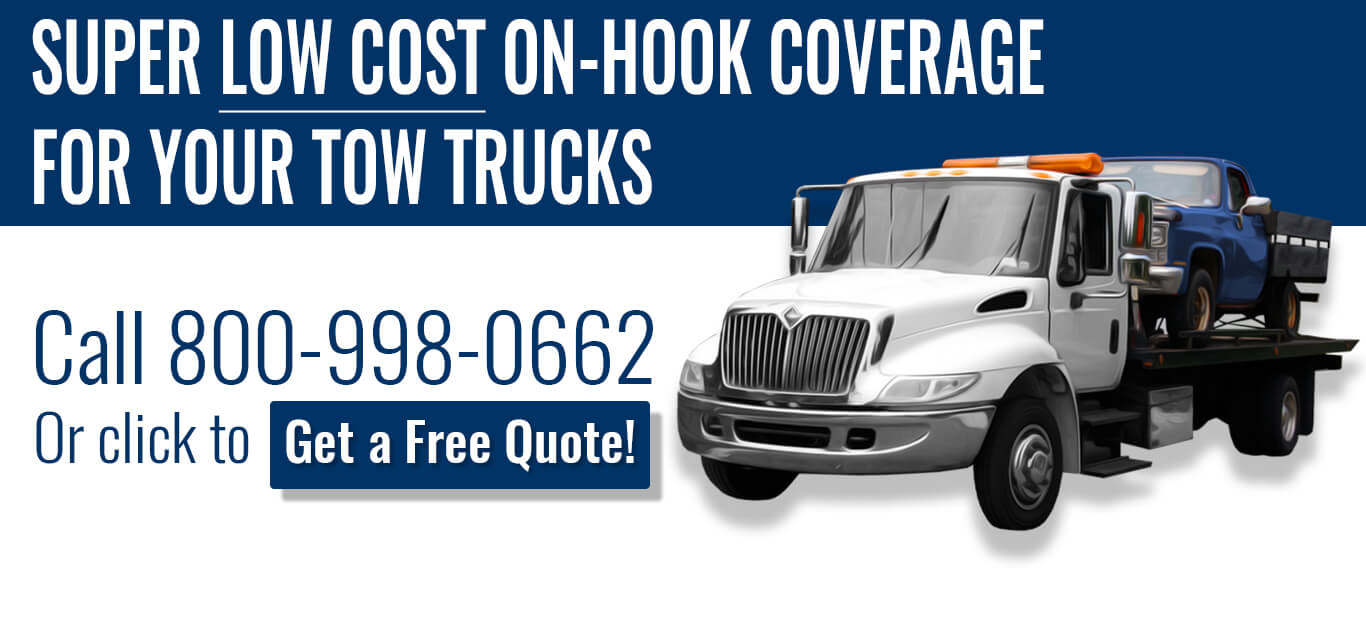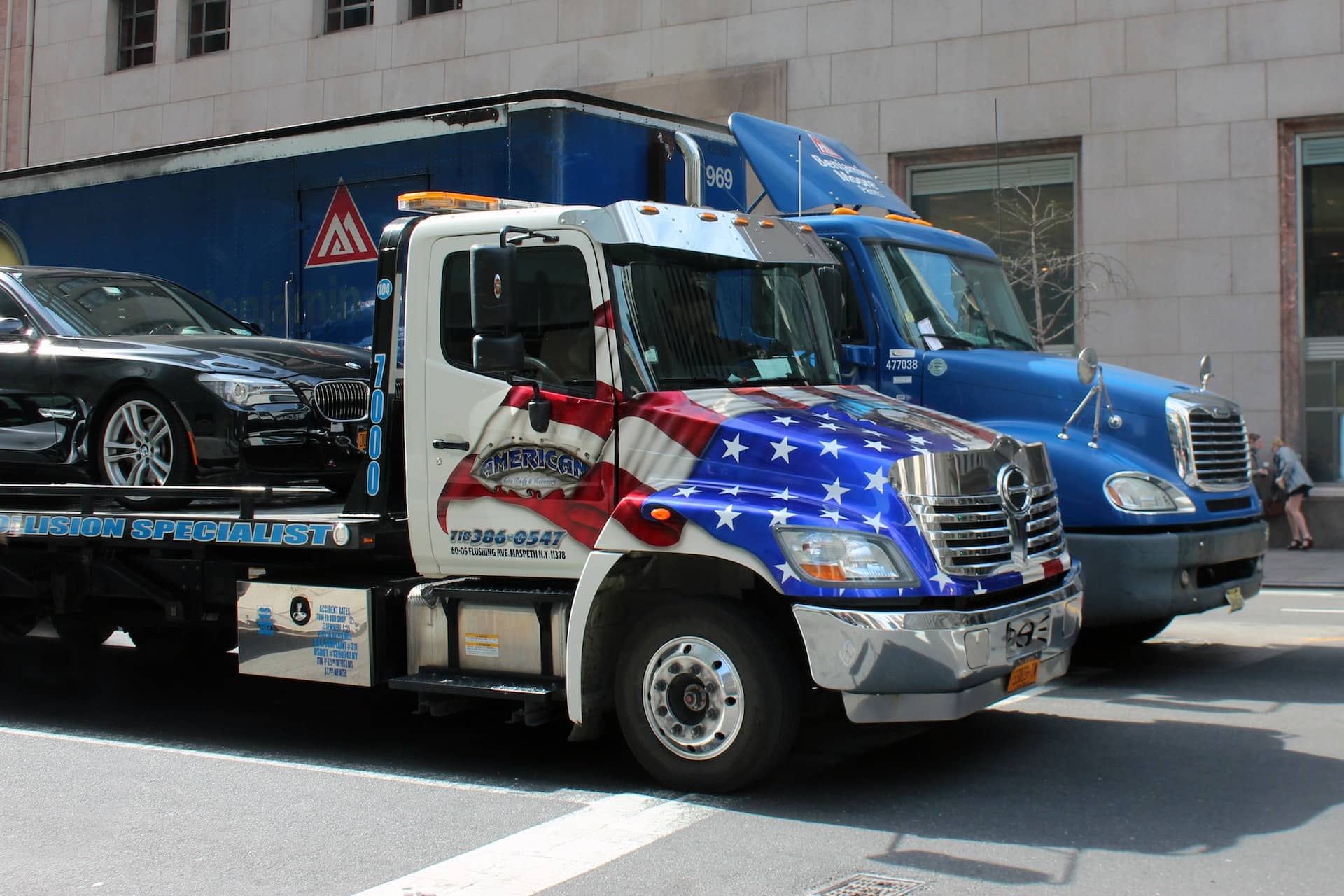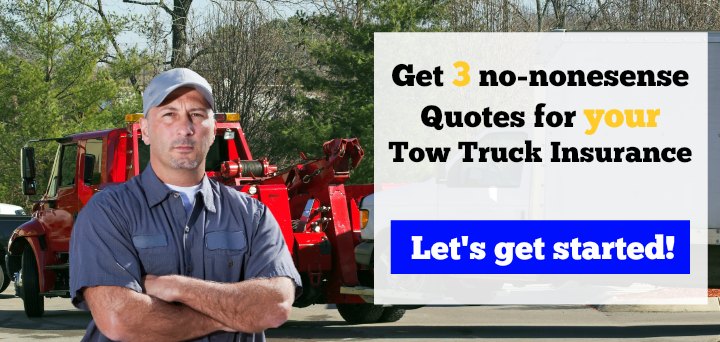Tow Truck Insurance Carriers
Tow truck insurance carriers are specialized insurance companies that provide insurance policies tailored to the unique risks faced by tow truck operators. These policies offer financial protection against potential liabilities arising from accidents, injuries, property damage, and other incidents related to towing operations.
Types of Tow Truck Insurance Policies
Tow truck insurance policies are designed to address the specific needs of tow truck operators and can be categorized into several types:
- Liability insurance:This is the most common type of insurance for tow truck operators and provides financial protection against claims arising from bodily injury or property damage caused by the tow truck operator’s negligence. Liability insurance covers legal expenses, medical bills, and property repair costs.
- Physical damage insurance:This type of insurance covers damage to the tow truck itself, including accidents, theft, vandalism, and natural disasters. It helps pay for repairs or replacement costs, ensuring the tow truck operator can continue their business.
- Cargo insurance:This policy protects the tow truck operator against losses or damages to vehicles or property being towed. It covers situations like accidents, theft, and damage during transportation.
- Workers’ compensation insurance:This insurance is required in many states for businesses with employees. It provides coverage for medical expenses, lost wages, and disability benefits for tow truck operators and their employees in case of work-related injuries or illnesses.
Factors Influencing the Cost of Tow Truck Insurance
Several factors influence the cost of tow truck insurance, including:
- Tow truck operator’s experience:Operators with more experience generally have lower insurance premiums, as they are considered less likely to be involved in accidents.
- Tow truck’s age and condition:Older or poorly maintained tow trucks are considered riskier, leading to higher insurance premiums.
- Type of towing services offered:Tow trucks involved in specialized towing, such as heavy-duty or emergency services, may face higher premiums due to the increased risks associated with those operations.
- Location:Tow truck insurance premiums can vary based on the location of operation. Areas with high traffic density or higher rates of accidents may have higher insurance costs.
- Safety record:Operators with a clean safety record, including no accidents or violations, typically receive lower insurance premiums.
- Insurance coverage limits:The amount of coverage selected by the tow truck operator, such as liability limits, affects the premium cost. Higher coverage limits generally result in higher premiums.
Essential Coverage for Tow Truck Operators: Tow Truck Insurance Carriers

Tow truck operators face a unique set of risks on the road, making comprehensive insurance coverage crucial for their safety and financial well-being. This guide Artikels the essential coverages for tow truck operators, highlighting their importance and benefits.
Liability Insurance
Liability insurance is a cornerstone of any tow truck operator’s insurance policy. It provides financial protection against claims arising from bodily injury or property damage caused by the tow truck operator’s negligence.
- Bodily Injury Liability:This coverage protects the tow truck operator against claims for medical expenses, lost wages, and pain and suffering resulting from injuries caused by an accident involving the tow truck.
- Property Damage Liability:This coverage protects the tow truck operator against claims for damage to another person’s property, including vehicles, structures, and personal belongings, resulting from an accident involving the tow truck.
Liability insurance is essential for tow truck operators because it protects them from potentially devastating financial losses in the event of an accident.
Physical Damage Coverage
Physical damage coverage, also known as collision and comprehensive coverage, protects the tow truck operator against financial losses resulting from damage to their tow truck.
- Collision Coverage:This coverage pays for repairs or replacement of the tow truck if it is damaged in an accident with another vehicle or object.
- Comprehensive Coverage:This coverage pays for repairs or replacement of the tow truck if it is damaged by events other than an accident, such as theft, vandalism, fire, or natural disasters.
Physical damage coverage is essential for tow truck operators because it helps to protect their investment in their tow truck and ensure that they can continue to operate their business even after an accident or other damaging event.
Choosing the Right Tow Truck Insurance Carrier

Choosing the right tow truck insurance carrier is crucial for protecting your business and ensuring you have the coverage you need in case of an accident or other unforeseen event. By carefully considering your specific needs and comparing different insurance options, you can find a policy that provides the best protection for your tow truck operation.
Factors to Consider When Choosing a Tow Truck Insurance Carrier
When selecting a tow truck insurance carrier, it is essential to consider several factors to ensure you obtain the best possible coverage and value for your money. Here is a checklist of key factors to consider:
- Coverage Options:Tow truck insurance policies vary in the types of coverage they offer. Some common coverage options include liability insurance, collision coverage, comprehensive coverage, and uninsured/underinsured motorist coverage. Consider your specific needs and the risks you face in your tow truck operation to determine the appropriate coverage levels.
- Premium Costs:The cost of tow truck insurance can vary significantly between carriers. Factors that influence premium costs include your driving history, the type of tow truck you operate, and the coverage you choose. Obtain quotes from multiple carriers to compare premium costs and find the most affordable option without compromising coverage.
- Claims Handling Process:A smooth and efficient claims handling process is essential when you need to file a claim. Research the reputation of different carriers for their claims handling process. Look for carriers with a history of fair and timely claim settlements.
- Customer Service:Excellent customer service is crucial for a positive insurance experience. Choose a carrier with a reputation for responsive and helpful customer service. Consider factors like availability of online resources, phone support, and 24/7 emergency assistance.
- Financial Stability:Ensure that the insurance carrier you choose is financially stable. A financially sound carrier is more likely to be able to pay claims in the event of a significant loss. Check the carrier’s financial ratings from reputable agencies like AM Best or Standard & Poor’s.
- Reputation:Consider the carrier’s reputation in the industry. Look for carriers with a strong track record of customer satisfaction and ethical business practices. Online reviews and industry publications can provide valuable insights into a carrier’s reputation.
Comparing Services Offered by Different Tow Truck Insurance Carriers
Tow truck insurance carriers offer a range of services and benefits. It’s crucial to compare these services to determine which carrier best meets your specific needs. Here are some key services to compare:
- Coverage Limits:The coverage limits offered by different carriers can vary significantly. Consider the potential financial risks you face and choose a carrier with coverage limits that adequately protect you in the event of a major accident or claim.
- Deductibles:The deductible is the amount you pay out-of-pocket before your insurance coverage kicks in. Higher deductibles generally result in lower premiums. Carefully consider your financial situation and choose a deductible you can comfortably afford.
- Discounts:Many carriers offer discounts for various factors, such as safe driving records, defensive driving courses, and multiple policies. Explore available discounts to potentially reduce your premium costs.
- Specialized Coverage:Some carriers offer specialized coverage options tailored to the specific needs of tow truck operators. These options might include coverage for towing equipment, cargo, or liability for damage to towed vehicles. Investigate whether a carrier offers coverage options relevant to your tow truck operation.
- 24/7 Roadside Assistance:Roadside assistance can be invaluable for tow truck operators, especially in emergency situations. Some carriers include roadside assistance as part of their policy, while others offer it as an optional add-on. Compare the roadside assistance services offered by different carriers and choose the option that best suits your needs.
Importance of Reading Policy Documents Carefully
Once you’ve narrowed down your choices, it’s essential to carefully review the policy documents before making a final decision. This step is crucial for understanding the specific terms and conditions of the policy and ensuring it meets your requirements. Here are some key points to focus on when reading policy documents:
- Exclusions:Pay close attention to any exclusions in the policy. Exclusions are specific situations or events that are not covered by the insurance. Make sure you understand the exclusions and that they don’t significantly impact your coverage needs.
- Definitions:The policy will define specific terms and phrases. Carefully review these definitions to ensure you understand the scope of coverage and any limitations.
- Conditions:The policy will Artikel specific conditions that must be met to receive coverage. These conditions might include reporting requirements, cooperation with the insurer, or limitations on coverage.
“Reading and understanding your insurance policy is crucial for ensuring you have the coverage you need and avoiding unexpected surprises when you need to file a claim.”
Tips for Saving Money on Tow Truck Insurance
Tow truck insurance is essential for any tow truck operator, but it can also be expensive. Fortunately, there are several ways to save money on your tow truck insurance premiums. By taking advantage of discounts, maintaining a good driving record, and avoiding common mistakes, you can significantly reduce your insurance costs.
Discounts
Tow truck insurance carriers offer a variety of discounts to help policyholders save money. Some common discounts include:
- Safe Driver Discount:This discount is typically offered to drivers with a clean driving record, meaning no accidents or traffic violations.
- Multi-Policy Discount:If you insure multiple vehicles with the same carrier, you may be eligible for a multi-policy discount.
- Good Student Discount:This discount is available to policyholders who have a good academic record.
- Anti-theft Device Discount:Installing anti-theft devices on your tow truck can qualify you for a discount.
- Loyalty Discount:Some insurance companies offer discounts to long-term policyholders.
Maintaining a Good Driving Record
One of the most effective ways to save money on tow truck insurance is to maintain a clean driving record. This means avoiding accidents, traffic violations, and other driving infractions.
A good driving record demonstrates to insurance companies that you are a responsible driver, which can lead to lower premiums.
Avoiding Common Mistakes
There are several common mistakes that can lead to higher insurance premiums. Avoiding these mistakes can help you save money on your tow truck insurance.
- Not Shopping Around:Getting quotes from multiple insurance companies can help you find the best rates.
- Choosing the Wrong Coverage:Make sure you have the right amount of coverage for your needs.
- Not Taking Advantage of Discounts:Be sure to ask your insurance carrier about any available discounts.
- Not Maintaining Your Tow Truck:Regular maintenance can help prevent accidents, which can lead to lower insurance premiums.
Common Claims and Exclusions

Tow truck insurance policies are designed to protect operators from financial losses due to accidents, property damage, and liability claims. However, understanding the common claims and exclusions associated with these policies is crucial for ensuring adequate coverage. This section delves into the most frequent claims made by tow truck operators and the common exclusions found in tow truck insurance policies.
Common Claims
Tow truck operators face a range of risks, leading to various types of claims. Understanding these common claims can help operators make informed decisions about their insurance coverage.
- Property Damage:This covers damage to the tow truck itself, the vehicle being towed, or any other property involved in an accident. Common causes include collisions with other vehicles, rollovers, or damage sustained while loading or unloading a vehicle.
- Bodily Injury Liability:This covers injuries sustained by third parties, such as pedestrians, passengers in other vehicles, or the driver of the towed vehicle, due to the negligence of the tow truck operator.
- Uninsured/Underinsured Motorist Coverage:This protects tow truck operators if they are involved in an accident with a driver who is uninsured or underinsured. This coverage can help cover medical expenses, lost wages, and property damage.
- Collision Coverage:This coverage pays for repairs or replacement of the tow truck in the event of a collision with another vehicle, regardless of fault.
- Comprehensive Coverage:This coverage protects the tow truck against damage caused by events other than collisions, such as theft, vandalism, fire, or natural disasters.
- Cargo Coverage:This coverage protects the tow truck operator for damage or loss of the towed vehicle or its contents.
Common Exclusions
Tow truck insurance policies typically contain exclusions that limit coverage for specific events or circumstances. It is essential to review these exclusions carefully to understand what is not covered.
- Intentional Acts:Most policies exclude coverage for damage or injury caused by intentional acts of the tow truck operator or their employees.
- Illegal Activities:Tow truck operators engaged in illegal activities, such as towing vehicles without proper authorization, are generally not covered by insurance.
- Operating Outside of Scope:Coverage may be excluded if the tow truck is being used for purposes other than those specified in the policy, such as personal use or commercial activities not related to towing.
- Mechanical Breakdown:Policies typically do not cover damage or losses resulting from mechanical breakdowns of the tow truck itself.
- Wear and Tear:Insurance generally does not cover damage caused by normal wear and tear on the tow truck.
- Acts of War or Terrorism:Coverage is typically excluded for damage or losses caused by acts of war or terrorism.
Tips for Avoiding Claims and Managing Risk
- Defensive Driving:Tow truck operators should practice defensive driving techniques to minimize the risk of accidents. This includes maintaining a safe following distance, avoiding distractions, and being aware of surrounding traffic.
- Regular Maintenance:Ensuring that the tow truck is properly maintained and in good working order can help prevent breakdowns and accidents.
- Proper Loading and Securing:Securely loading and securing vehicles on the tow truck is crucial to prevent damage to the towed vehicle and to avoid accidents caused by unsecured loads.
- Background Checks:If employing other drivers, tow truck operators should conduct thorough background checks to ensure they have a safe driving record and are qualified to operate the tow truck.
- Compliance with Regulations:Tow truck operators should be familiar with and comply with all applicable local, state, and federal regulations regarding towing practices.
Resources for Tow Truck Operators
Running a tow truck business can be challenging, but there are resources available to help operators succeed. Accessing these resources can provide valuable information, support, and networking opportunities.
Industry Associations and Organizations
Industry associations and organizations provide a platform for tow truck operators to connect with peers, share best practices, and stay informed about industry trends. These groups also advocate for the interests of tow truck operators and work to improve the industry as a whole.
- Towing & Recovery Association of America (TRAA): The TRAA is a national organization dedicated to promoting the professionalism and safety of the towing and recovery industry. It offers resources such as training programs, certification opportunities, and industry news.
- National Towing & Recovery Association (NTRA): The NTRA is another national organization that provides a range of resources to tow truck operators, including legislative advocacy, industry education, and business development tools.
- State and Local Towing Associations: In addition to national organizations, there are often state and local towing associations that provide resources and support specific to a particular region. These associations can be valuable for networking and staying informed about local regulations.
Government Websites
Government websites can be valuable sources of information for tow truck operators, including regulations, licensing requirements, and safety guidelines.
- Federal Motor Carrier Safety Administration (FMCSA): The FMCSA is the federal agency responsible for regulating the trucking industry, including tow trucks. Its website provides information on safety regulations, licensing requirements, and compliance resources.
- State Department of Motor Vehicles (DMV): Each state has a DMV that handles vehicle registration, licensing, and other related matters. The DMV website provides information on tow truck licensing requirements, registration procedures, and safety regulations specific to that state.
- Local Government Websites: Many cities and counties have websites that provide information on local regulations, permits, and other requirements for tow truck operators.
Other Resources, Tow truck insurance carriers
In addition to industry associations and government websites, there are other resources that can be helpful for tow truck operators.
- Online Forums and Communities: Online forums and communities provide a platform for tow truck operators to connect with peers, ask questions, and share experiences. These forums can be a valuable source of information and support.
- Industry Publications: There are several industry publications that provide news, articles, and information relevant to the towing and recovery industry. These publications can keep operators informed about industry trends, best practices, and new technologies.
- Training Courses: Training courses can help tow truck operators improve their skills and knowledge. These courses may cover topics such as vehicle recovery techniques, safety procedures, and customer service.
Clarifying Questions
What are the most common exclusions in tow truck insurance policies?
Common exclusions in tow truck insurance policies include coverage for intentional acts, damage caused by wear and tear, and incidents involving vehicles that are not legally registered or insured.
How can I avoid claims and manage risk as a tow truck operator?
To avoid claims and manage risk, tow truck operators should adhere to safety regulations, maintain their vehicles regularly, and conduct thorough inspections before each tow. Additionally, they should ensure proper documentation for all tows and maintain a professional demeanor with customers.
What are some reputable resources for tow truck operators?
Reputable resources for tow truck operators include industry associations like the Towing & Recovery Association of America (TRAA), government websites such as the Federal Motor Carrier Safety Administration (FMCSA), and insurance brokers specializing in commercial vehicle insurance.